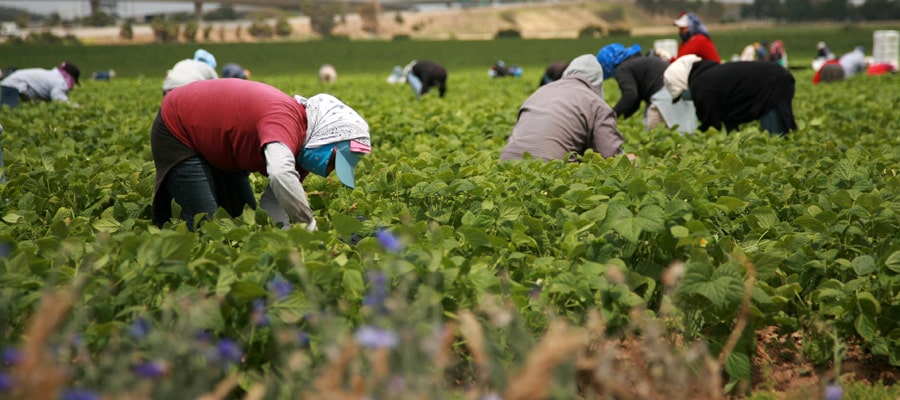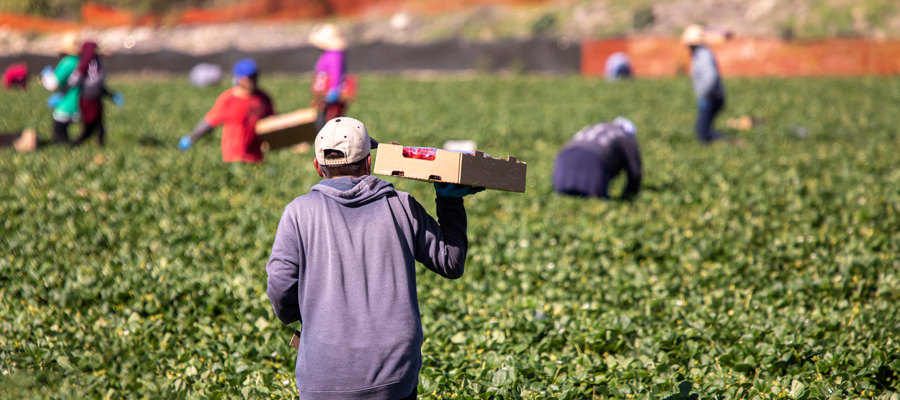Government wrong to exclude farm workers from basic minimum wage protection

A crowded van picks up an elderly Punjabi grandmother. After a 45-minute unpaid ride to the farm, she picks blueberries in the hot sun for up to ten hours with no overtime pay. If she slows down or takes too many breaks in the shade, the contractor may arbitrarily decide she hasn’t earned enough hours to qualify for EI to top up her sparse winter income. If the harvest is poor or her employer doesn’t record berry weights accurately, she often earns less than minimum wage.
No one would wish this on their grandmother.
BC’s Employment Standards Act, however, makes this scenario all too common for immigrant farm workers, many of whom are older Indo-Canadian women. Under the piece rate system, which covers 15 crops, pickers are paid for what they harvest, meaning they can be legally paid less than minimum wage—an ‘alternate’ minimum wage in government speak. Increases in piece rates have been set haphazardly and haven’t kept up with the general minimum wage. For example, the inflation-adjusted hourly minimum wage increased by 40 per cent from 1992 to 2017, but the inflation-adjusted piece rate for blueberries remained unchanged.
It was greatly disappointing, therefore, that the BC government chose not to make this right when responding to the latest recommendations of the Fair Wages Commission (FWC) on April 19.
Under the piece rate system pickers can be legally paid less than minimum wage.
Labour Minister Harry Bains announced that the sub-minimum piece rate wages for farm workers would not increase until January 2019, when they will rise by 11.5 per cent. This decision flies in the face of the FWC recommendation to increase piece rates 15 per cent on June 1 (before the summer harvest) and then scrap the farm worker piece rate system entirely next year, providing these vulnerable workers with full minimum wage. The government says it will study piece rates further, but the FWC recommendations were already based on a thorough report by Professor Mark Thompson, BC’s former employment standards review commissioner.
A report by the BC Employment Standards Coalition, submitted to the Commission, found that exempting farm workers from basic employment standards makes them vulnerable to exploitation. A piece rate system pressures pickers to work at a dangerously fast pace for long hours and to skip meal breaks, violating Sections 32 and 39 of BC’s Employment Standards Act.
Since 2004, BC farm employers have increasingly hired international migrant workers through various streams of the Temporary Foreign Worker Program. Migrant workers now make up at least half of BC’s farm workers, and unlike permanent residents and Canadian citizens they must legally be paid at least minimum wage. Inconsistent rules can sow misinformation and pit workers against one another, ultimately lowering wages and working conditions. The Canadian Centre for Policy Alternatives has argued that if BC’s agricultural industry can pay an hourly minimum wage for temporary migrant farm workers they should be able to do likewise for all farm workers.
Exempting farm workers from basic employment standards makes them vulnerable to exploitation.
Agricultural employers argue that piece rates maximize worker productivity. And many piece rate farm workers we interviewed, including seasonal workers from Quebec, want to earn more than minimum wage at the height of picking season. But replacing the piece rate system with the hourly minimum wage would still allow employers to provide productivity incentives that currently exist and like those in commission sales jobs.
We applaud the government for phasing out the sub-minimum wage for liquor servers, which is also a win for gender equality. Research shows that depending on tips leaves liquor servers prone to customer sexual harassment; 81 per cent of food and beverage servers in BC are women. Similarly, women are disproportionately represented among immigrant farm workers. Skills they bring to the job like manual dexterity are often stereotyped as ‘natural’ feminine traits and don’t fetch corresponding economic or social rewards. BC’s piece rate system not only undermines gender equality, but also racial justice. During the Fair Wages Commission’s public consultations, a former Employment Standards Branch regional manager declared, “it is hard to see farm worker piece rates as anything other than racist and abusive.”
The working conditions of those who harvest our food, including many elderly immigrant women, should at least be dignified. At a bare minimum, the Ministry of Labour must ensure all farm workers have equal access to the same remuneration, rights and protections as other British Columbia workers. This ongoing exclusion from basic protections needs to be quickly revisited.
Topics: Economy, Employment & labour, Immigrants & refugees


